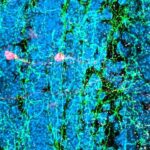Lien vers Pubmed [PMID] – 15030409
J. Neurochem. 2004 Apr;89(1):248-56
Intracellular activation and trafficking of extracellular signal-regulated protein kinases (ERK) play a significant role in cell cycle progression, contributing to developmental brain activities. Additionally, mitochondria participate in cell signalling through energy-linked functions, redox metabolism and activation of pro- or anti-apoptotic proteins. The purpose of the present study was to analyze the presence of ERK1/2 in mitochondria during rat brain development. Immunoblotting, immune electron microscopy and activity assays demonstrated that ERK1/2 are present in fully active brain mitochondria at the outer membrane/intermembrane space fraction. Besides, it was observed that ERK1/2 translocation to brain mitochondria follows a developmental pattern which is maximal between E19-P2 stages and afterwards declines at P3, just before maximal translocation to nucleus, and up to adulthood. Most of mitochondrial ERK1/2 were active; upstream phospho-MAPK/ERK kinases (MEK1/2) were also detected in the brain organelles. Mitochondrial phospho-ERK1/2 increased at 1 microm hydrogen peroxide (H(2)O(2)) concentration, but it decreased at higher 50-100 microm H(2)O(2), almost disappearing after the organelles were maximally stimulated to produce H(2)O(2) with antimycin. Our results suggest that developmental mitochondrial activation of ERK1/2 cascade contributes to its nuclear translocation effects, providing information about mitochondrial energetic and redox status to the proliferating/differentiating nuclear pathways.


